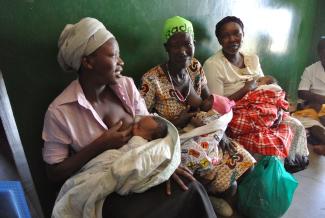In many developing countries, traditional training techniques are ineffective or outdated. Often skills are not retained or health staff does not even show up for the training workshops. In countries like Uganda, where 6,300 women die each year from pregnancy complications, skilled healthcare workers are crucial to survival. Cherrie Evans, Gabi Conecker and their team at Jhpiego— an affiliate of Johns Hopkins University in Baltimore, Maryland— knew that if they were to improve high quality healthcare for mothers and babies in Uganda then they had to start by improving the training of health providers.
Jhpiego started by looking at evidence that showed that traditional workshop trainings were not effective. They wanted to incorporate a training program that was team-based and frequently reinforced after the training had been completed. They partnered with Protecting Families against HIV/AIDS (PREFA) and the American Academy for Pediatrics to figure out how they could effectively build knowledge and skills of frontline health workers in Uganda. They looked at how to create a “Day of Birth” training package that addressed two major maternal and child health issues that occur on the day of birth: postpartum hemorrhage- a mother’s excessive bleeding after giving birth- and birth asphyxia- a baby’s failure to breathe after birth.
“Facility-based, team training that uses hands on learning achieves better change in provider performance than workshop based training,” Cherrie says. They also considered how care for mothers and newborns is linked, usually provided by the same provider, so learning how to give that care should also be linked. With all of this in mind, the team built on previous partnerships to develop a one day team training package that extended the impact of two proven interactive modules, Helping Babies Breathe and Bleeding After Birth, that reviewed the moment of birth and the postpartum needs of mother and baby that followed. After the training, health staff would regularly practice to ensure retention of what they had learned.
The Jhpiego team applied to Saving Lives at Birth in 2012 and won an award to test their training package in Uganda. “USAID was very supportive and engaged in the project. They always came back to us with thoughtful and probing feedback,” Gabi says. She also notes how USAID was crucial in linking them to other partners who were useful in helping with their innovation.
Innocent Atukunda, the Jhpiego project manager on the ground, recalls a visit she made to a health clinic in the Kaberamaido District in Uganda where she observed mother Susan Nabwire deliver triplets. Nurse-midwife Christine Apio was prepared to deliver twins and had an extra pair of gloves and equipment ready to go. However neither she nor Susan was prepared for a third baby. “There are more coming!” Christine shouted as she scrambled for supplies. As the triplets were delivered they were not breathing and needed resuscitation. The health staff used their training and equipment that they had received around Helping Babies Breathe. The babies would not have survived had the facility not received training or lifesaving equipment through the Saving Lives at Birth grant. “I really thank Saving Lives at Birth for teaching me how to resuscitate babies. I had no idea [how to resuscitate newborns] before, and I saw today that I can manage so well. Practice helped me to improve my skills,” nurse assistant Doreen Aguti says.
“The unexpected arrival of triplets [who are all alive and well] is exactly why Saving Lives at Birth is so important. Preparation, training and having the right equipment available ensures that health workers can meet any challenge. Moms and babies deserve the absolute best care, whether the birth is routine, complicated or surprising,” says Cherrie.
The results of Jhpiego’s grant were very promising, showing that their “Day of Birth” training package decreased postpartum bleeding by 17 percent, stillbirth by 32 percent, and newborn death by 67 percent across 125 facilities in Uganda. Jhpiego is currently moving their training package to scale in Uganda and working with additional partners such as International Confederation of Midwives, UNFPA, International Federation of Gynecology and Obstetrics, American Academy of Pediatrics, and International Council of Nurses to expand their capacity building modules on a global level.

Jhpiego
